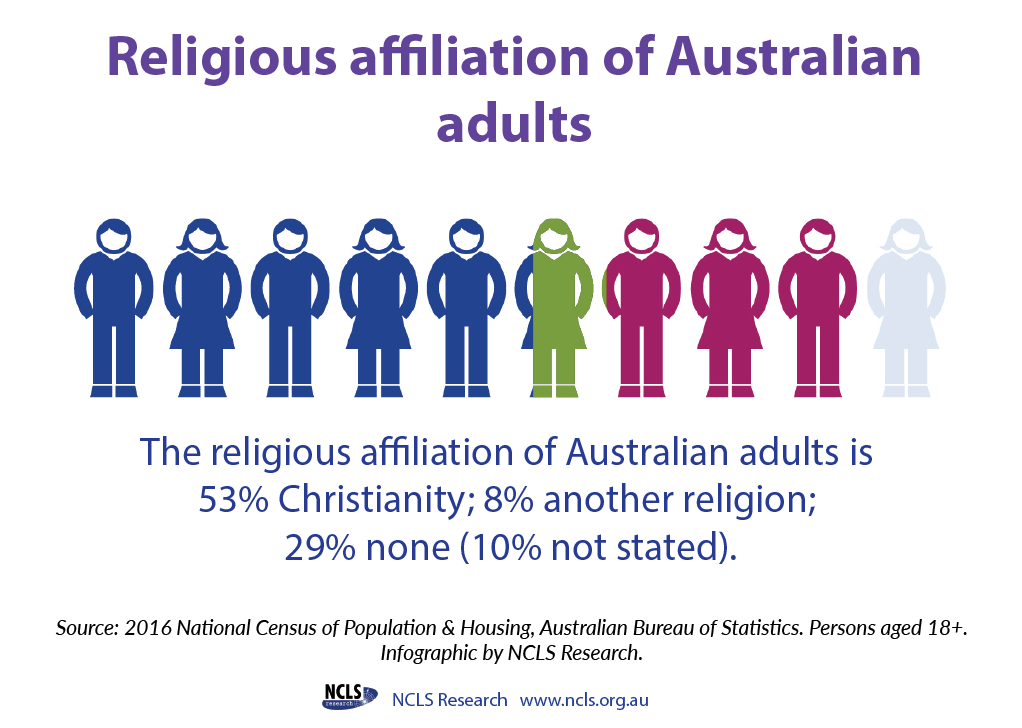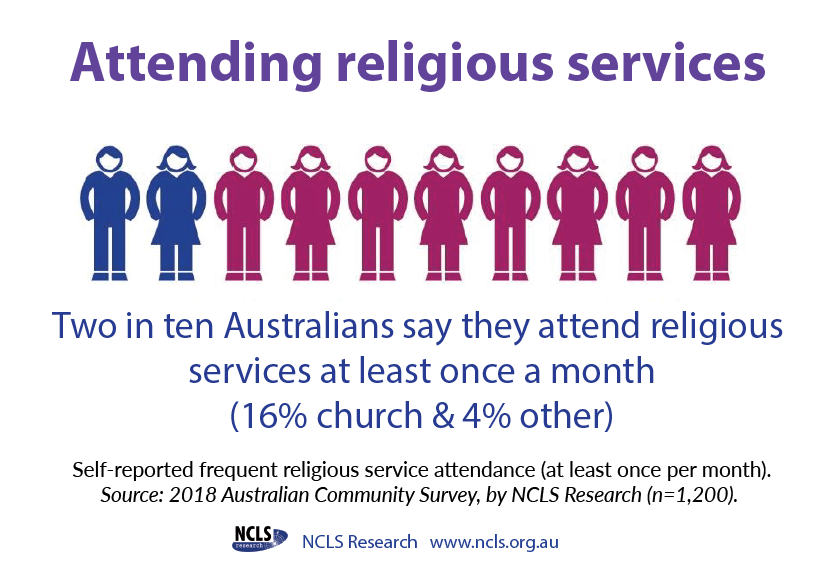Overall, Australians are moderately religious. While religiousness and spirituality have eroded over time, religious practices, beliefs and experiences continue to be seen.
A profile of a person’s religiousness or spirituality has multiple dimensions. In this article we explore the religiosity of Australians in these areas:
- Religious affiliation
- Public religious practice
- Private religious practice
- Mystical or spiritual experiences
- Belief in God
- Importance of faith
Religious affiliation
A person’s religious affiliation, or religious identification, is one aspect of their identity. While it does not simply translate to holding specific religious beliefs or doing certain practices, it can be helpful, because it provides clues about belonging or being shaped by particular worldviews.
It is a dimension of religiousness that is measured in the question in the five-yearly National Census of Population and Housing “What is this person’s religion?”
Around half of all Australians aged 18+ identified as Christian (53%, including 22% Catholic), some 8% identified with another religion and 29% chose “no religion” in the 2016 Census (ABS, 2016). The Census religion question is optional and in 2016, 10% did not respond.
The religious affiliation patterns in the sample of Australians who completed the 2018 Australian Community Survey by NCLS Research are close to the national figures: 52% Christianity (including 19% Catholic), and 8% indicated a religion other than Christianity. Almost four in 10 (38%) had no religion and 2% preferred not to say.

Importance of religious affiliation
How important or salient religious identity is for a person’s sense of self and their belonging will vary widely.
For some it will be highly salient, representing a strong and active life of faith. For others, it may represent a long-term or historical family affiliation to a certain faith tradition. Religious identity may be integrated with a more collective approach, signifying belonging to a particular community, perhaps in a similar way to one’s ethnic identity.
The increase in the proportion of Australians who have no religious affiliation in recent decades signifies a declining importance of a religious identity for many, particularly younger Australians.
Public religious practice
Attendance at religious services is an example of a public religious practice. Respondents in the 2018 ACS were asked to indicate how often they attended religious services, apart from such special occasions as weddings, funerals etc.

How often do Australians attend religious services?
One in five Australians (20%) can be described as “frequent attenders”, defined as attending religious services at least once a month. This is made up of some 13% who reported that they attend religious services at least once a week and 8% who attend at least once a month. Almost half (48%) of all Australians reported that they never attend religious services.

Private religious practice
With regard to private religious practice, 30% of Australians pray or meditate at least once a week. That is, 18% reported praying or meditating most days or more often, with a further 12% doing so at least once a week or a few times a week.
Another 28% reported praying or meditating occasionally (14%) or hardly ever (14%). Some four in 10 never prayed or meditated.


Mystical or spiritual experiences

Religious or spiritual experiences can be part of everyday life, but they can refer to experiences beyond the ordinary. The 2018 ACS contained a question about mystical and supernatural experiences that has been used widely in surveys across the world.
When asked whether they have ever had a mystical or supernatural experience, either positive or negative, and about which they have no doubt it was real, over a quarter (27%) answered yes. A further 35% either knew somebody else who had an experience like this or believed that such experiences could happen. Some 9% weren’t sure. Just three in 10 (29%) did not believe that such experiences occur.
Belief in God

There is an extensive array of religious beliefs across the world’s religions. In the 2018 ACS, a simple approach was taken, which was to ask “Which of these statements comes closest to your belief about God?”
Responses can be divided into the following groups:
- Believers: In 2018, 56%, or a slim majority, of Australians believed in God (26%) or a spirit or life force (30%),
- Agnostic: Some 20% held an agnostic position, indicating “I don’t really know what to think”, and
- Atheist: Some 23% of Australians indicated they were atheist, selecting “I don’t really think there is any sort of spirit, God or life force”.
Importance of faith
While individuals might affiliate with a religion, believe in God, and take part in public or private religious or spiritual practices, how important is this to their life’s decisions, such as career, relationships and lifestyle? This is a measure of the salience of a person’s actions or beliefs for other aspects of life.
More than four in 10 Australians (44%) indicated that faith or spirituality was important or very important in shaping their decisions. It was of little importance for 23% and a third of respondents indicated that religious faith or spirituality was not important in shaping their life’s decisions.

Conclusion
This article sought to provide a religious and spiritual profile of Australians across a range of dimensions.
First, Australians can be described as moderately religious. While the levels of religiousness and spirituality have eroded over time, religious practices, beliefs and experiences continue to be present. The 2018 ACS revealed that some 20% of Australians were frequent attenders at religious services (16% at churches) and three in 10 prayed or meditated at least once a week. More than a quarter have had a mystical or supernatural experience, with more open to the idea that such an experience is possible. The majority of Australians (56%) believed in God, a spirit or life force.
Our research confirms that religion and spirituality continue to be integrated into the lives of many Australians.



